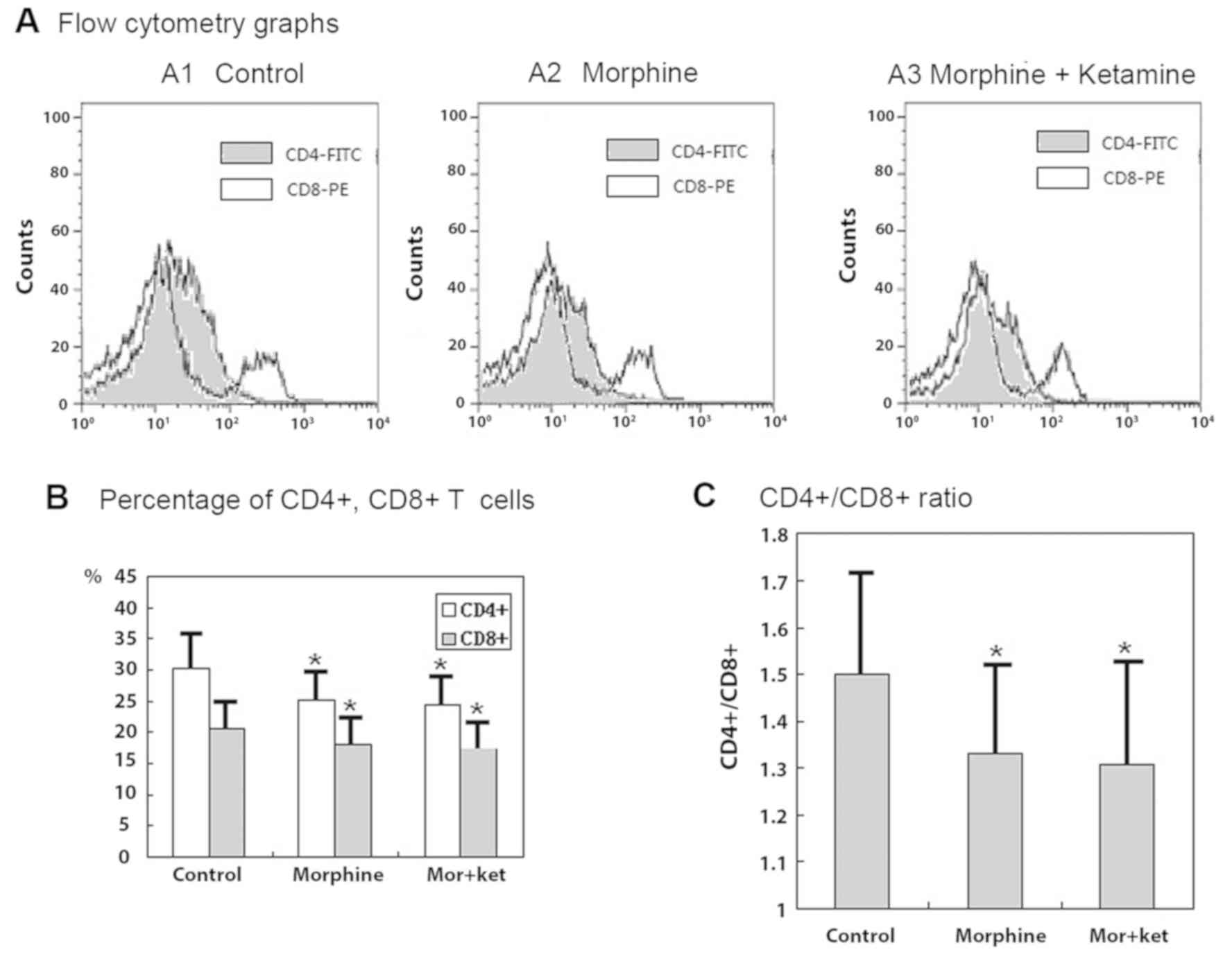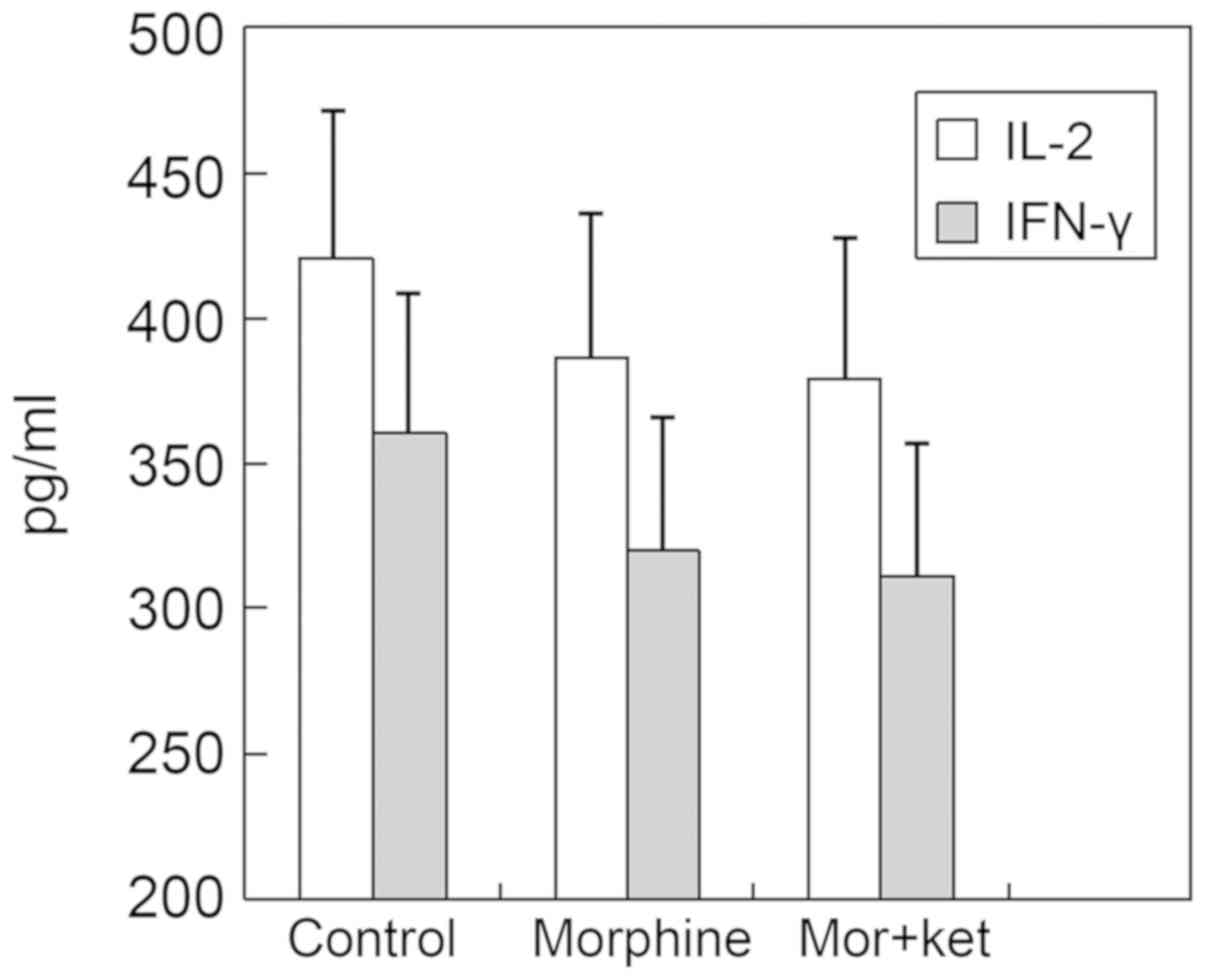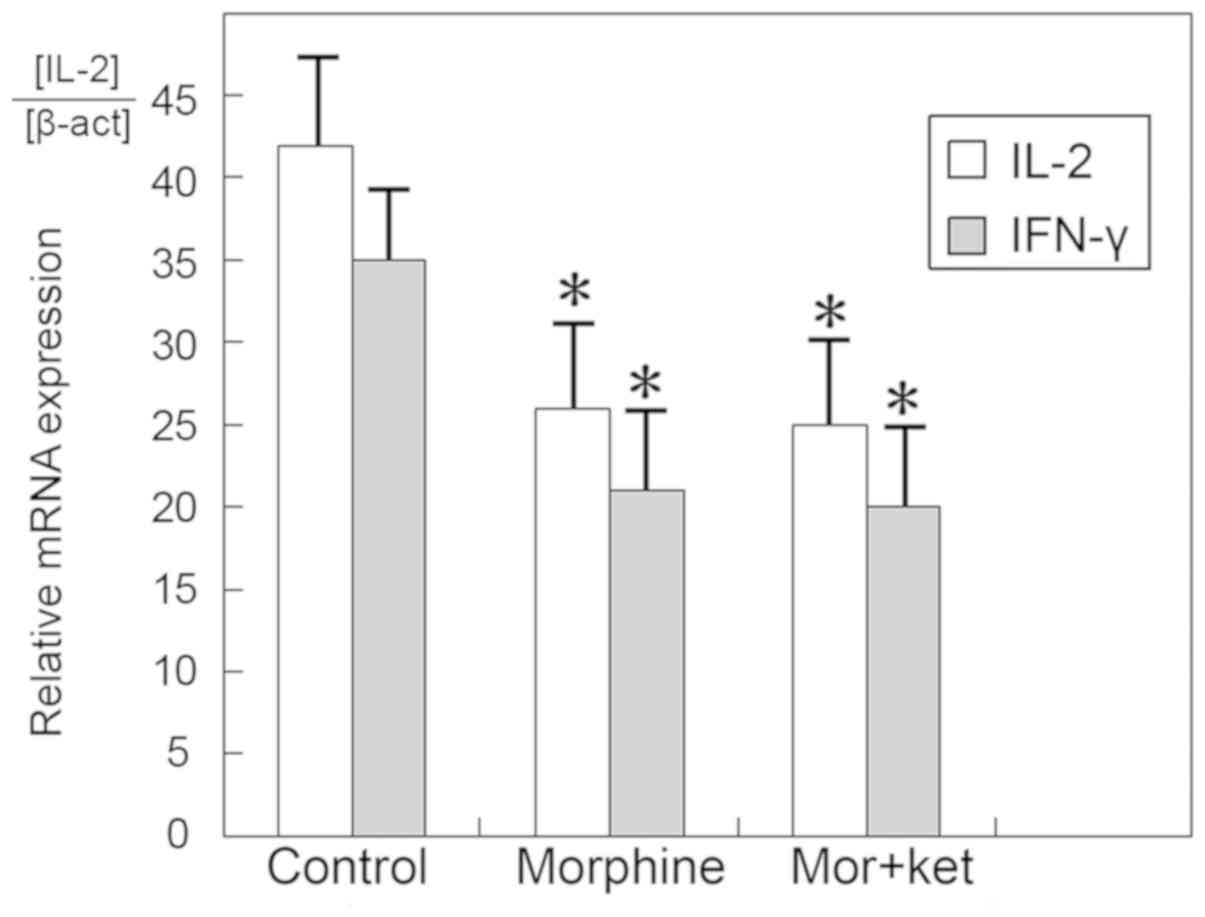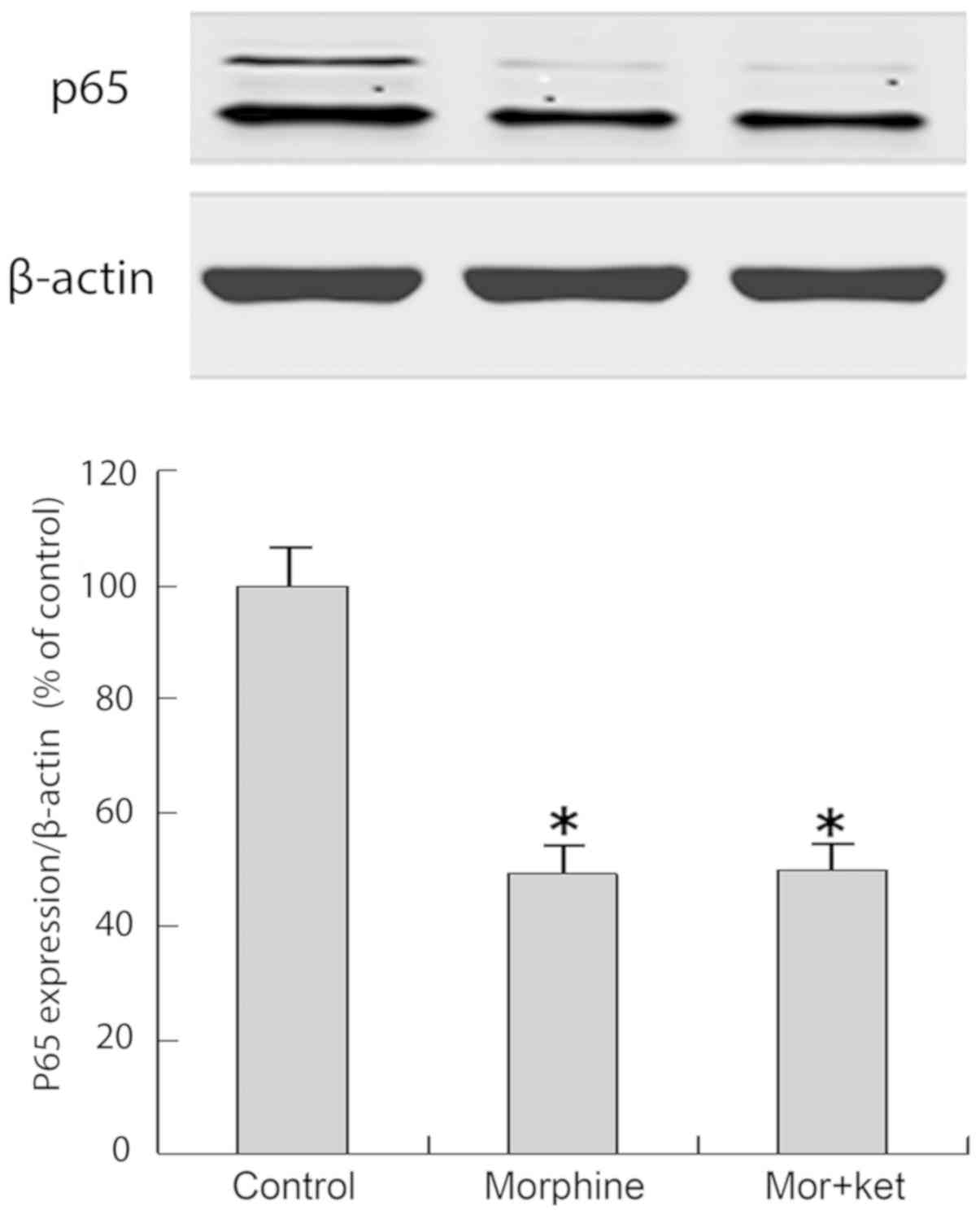|
1
|
Page GG, Ben-Eliyahu S, Yirmiya R and
Liebeskind JC: Morphine attenuates surgery-induced enhancement of
metastatic colonization in rats. Pain. 54:21–28. 1993. View Article : Google Scholar : PubMed/NCBI
|
|
2
|
Sasamura T, Nakamura S, Iida Y, Fuji H,
Murata J, Saiki I, Nojima H and Kuraishi Y: Morphine analgesia
suppresses tumor growth and metastasis in a mouse model of cancer
pain produced by orthotopic tumor inoculation. Eur J Pharmacol.
441:185–191. 2002. View Article : Google Scholar : PubMed/NCBI
|
|
3
|
Zech DF, Grond S, Lynch J, Hertel D and
Lehmann KA: Validation of World Health Organization guidelines for
cancer pain relief: A 10-year prospective study. Pain. 63:65–76.
1995. View Article : Google Scholar : PubMed/NCBI
|
|
4
|
Collins JJ, Grier HE, Kinney HC and Berde
CB: Control of severe pain in children with terminal malignancy. J
Pediatr. 126:653–657. 1995. View Article : Google Scholar : PubMed/NCBI
|
|
5
|
Hurwitz CA, Duncan J and Wolfe J: Caring
for the child with cancer at the close of life: ‘There are people
who make it and I'm hoping I'm one of them.’. JAMA. 292:2141–2149.
2004. View Article : Google Scholar : PubMed/NCBI
|
|
6
|
Jalmsell L, Kreicbergs U, Onelöv E,
Steineck G and Henter JI: Symptoms affecting children with
malignancies during the last month of life: A nationwide follow-up.
Pediatrics. 117:1314–1320. 2006. View Article : Google Scholar : PubMed/NCBI
|
|
7
|
Wolfe J, Grier HE, Klar N, Levin SB,
Ellenbogen JM, Salem-Schatz S, Emanuel EJ and Weeks JC: Symptoms
and suffering at the end of life in children with cancer. N Engl J
Med. 342:326–333. 2000. View Article : Google Scholar : PubMed/NCBI
|
|
8
|
Finkel JC, Pestieau SR and Quezado ZM:
Ketamine as an adjuvant for treatment of cancer pain in children
and adolescents. J Pain. 8:515–521. 2007. View Article : Google Scholar : PubMed/NCBI
|
|
9
|
Mercadante S, Lodi F, Sapio M, Calligara M
and Serretta R: Longterm ketamine subcutaneous continuous infusion
in neuropathic cancer pain. J Pain Symptom Manage. 10:564–568.
1995. View Article : Google Scholar : PubMed/NCBI
|
|
10
|
Elsewaisy O, Slon B and Monagle J:
Analgesic effect of subanesthetic intravenous ketamine in
refractory neuropathic pain: A case report. Pain Med. 11:946–950.
2010. View Article : Google Scholar : PubMed/NCBI
|
|
11
|
Webster LR and Walker MJ: Safety and
efficacy of prolonged outpatient ketamine infusions for neuropathic
pain. Am J Ther. 13:300–305. 2006. View Article : Google Scholar : PubMed/NCBI
|
|
12
|
Visser E and Schug SA: The role of
ketamine in pain management. Biomed Pharmacother. 60:341–348. 2006.
View Article : Google Scholar : PubMed/NCBI
|
|
13
|
Subramaniam K, Subramaniam B and
Steinbrook RA: Ketamine as adjuvant analgesic to opioids: A
quantitative and qualitative systematic review. Anesth Analg.
99:482–495. 2004. View Article : Google Scholar : PubMed/NCBI
|
|
14
|
Grond S, Radbruch L, Meuser T, Sabatowski
R, Loick G and Lehmann KA: Assessment and treatment of neuropathic
cancer pain following WHO guidelines. Pain. 79:15–20. 1999.
View Article : Google Scholar : PubMed/NCBI
|
|
15
|
Cherny NI, Thaler HT, Friedlander-Klar H,
Lapin J, Foley KM, Houde R and Portenoy RK: Opioid responsiveness
of cancer pain syndromes caused by neuropathic or nociceptive
mechanisms: A combined analysis of controlled, single-dose studies.
Neurology. 44:857–861. 1994. View Article : Google Scholar : PubMed/NCBI
|
|
16
|
Martin LA and Hagen NA: Neuropathic pain
in cancer patients: Mechanisms, syndromes, and clinical
controversies. J Pain Symptom Manage. 14:99–117. 1997. View Article : Google Scholar : PubMed/NCBI
|
|
17
|
Enarson MC, Hays H and Woodroffe MA:
Clinical experience with oral ketamine. J Pain Symptom Manage.
17:384–386. 1999. View Article : Google Scholar : PubMed/NCBI
|
|
18
|
Coggeshall RE and Carlton SM: Receptor
localization in the mammalian dorsal horn and primary afferent
neurons. Brain Res Brain Res Rev. 24:28–66. 1997. View Article : Google Scholar : PubMed/NCBI
|
|
19
|
Persson J, Axelsson G, Hallin RG and
Gustafsson LL: Beneficial effects of ketamine in a chronic pain
state with allodynia, possibly due to central sensitization. Pain.
60:217–222. 1995. View Article : Google Scholar : PubMed/NCBI
|
|
20
|
Okon T: Ketamine: An introduction for the
pain and palliative medicine physician. Pain Physician. 10:493–500.
2007.PubMed/NCBI
|
|
21
|
Grande LA, O'Donnell BR, Fitzgibbon DR and
Terman GW: Ultra-low dose ketamine and memantine treatment for pain
in an opioid-tolerant oncology patient. Anesth Analg.
107:1380–1383. 2008. View Article : Google Scholar : PubMed/NCBI
|
|
22
|
Shimoyama N, Shimoyama M, Inturrisi CE and
Elliott KJ: Ketamine attenuates and reverses morphine tolerance in
rodents. Anesthesiology. 85:1357–1366. 1996. View Article : Google Scholar : PubMed/NCBI
|
|
23
|
Weber RJ and Pert A: The periaqueductal
gray matter mediates opiate-induced immunosuppression. Science.
245:188–190. 1989. View Article : Google Scholar : PubMed/NCBI
|
|
24
|
Gavériaux-Ruff C, Matthes HW, Peluso J and
Kieffer BL: Abolition of morphine-immunosuppression in mice lacking
the mu-opioid receptor gene. Proc Natl Acad Sci USA. 95:6326–6330.
1998. View Article : Google Scholar : PubMed/NCBI
|
|
25
|
Roy S, Barke RA and Loh HH: MU-opioid
receptor-knockout mice: Role of mu-opioid receptor in morphine
mediated immune functions. Brain Res Mol Brain Res. 61:190–194.
1998. View Article : Google Scholar : PubMed/NCBI
|
|
26
|
Roy S, Charboneau RG and Barke RA:
Morphine synergizes with lipopolysaccharide in a chronic
endotoxemia model. J Neuroimmunol. 95:107–114. 1999. View Article : Google Scholar : PubMed/NCBI
|
|
27
|
Sacerdote P, Gaspani L and Panerai AE: The
opioid antagonist naloxone induces a shift from type 2 to type 1
cytokine pattern in normal and skin-grafted mice. Ann NY Acad Sci.
917:755–763. 2000. View Article : Google Scholar : PubMed/NCBI
|
|
28
|
Peng X, Mosser DM, Adler MW, Rogers TJ,
Meissler JJ Jr and Eisenstein TK: Morphine enhances interleukin-12
and the production of other pro-inflammatory cytokines in mouse
peritoneal macrophages. J Leukoc Biol. 68:723–728. 2000.PubMed/NCBI
|
|
29
|
Chao CC, Molitor TW, Close K, Hu S and
Peterson PK: Morphine inhibits the release of tumor necrosis factor
in human peripheral blood mononuclear cell cultures. Int J
Immunopharmacol. 15:447–453. 1993. View Article : Google Scholar : PubMed/NCBI
|
|
30
|
Roy S, Cain KJ, Chapin RB, Charboneau RG
and Barke RA: Morphine modulates NF kappa B activation in
macrophages. Biochem Biophys Res Commun. 245:392–396. 1998.
View Article : Google Scholar : PubMed/NCBI
|
|
31
|
Roy S, Chapin RB, Cain KJ, Charboneau RG,
Ramakrishnan S and Barke RA: Morphine inhibits transcriptional
activation of IL-2 in mouse thymocytes. Cell Immunol. 179:1–9.
1997. View Article : Google Scholar : PubMed/NCBI
|
|
32
|
Roy S, Balasubramanian S, Sumandeep S,
Charboneau R, Wang J, Melnyk D, Beilman GJ, Vatassery R and Barke
RA: Morphine directs T cells toward T(H2) differentiation. Surgery.
130:304–309. 2001. View Article : Google Scholar : PubMed/NCBI
|
|
33
|
Roy S, Wang J, Charboneau R, Loh HH and
Barke RA: Morphine induces CD4+ T cell IL-4 expression through an
adenylyl cyclase mechanism independent of the protein kinase A
pathway. J Immunol. 175:6361–6367. 2005. View Article : Google Scholar : PubMed/NCBI
|
|
34
|
Wang J, Barke RA, Charboneau R, Loh HH and
Roy S: Morphine negatively regulates interferon-gamma promoter
activity in activated murine T cells through two distinct cyclic
AMP-dependent pathways. J Biol Chem. 278:37622–37631. 2003.
View Article : Google Scholar : PubMed/NCBI
|
|
35
|
Wang J, Barke RA and Roy S:
Transcriptional and epigenetic regulation of interleukin-2 gene in
activated T cells by morphine. J Biol Chem. 282:7164–7171. 2007.
View Article : Google Scholar : PubMed/NCBI
|
|
36
|
Pacifici GM: Metabolism and
pharmacokinetics of morphine in neonates: A review. Clinics (Sao
Paulo). 71:474–480. 2016. View Article : Google Scholar : PubMed/NCBI
|
|
37
|
Heiskanen T, Langel K, Gunnar T, Lillsunde
P and Kalso EA: Opioid concentrations in oral fluid and plasma in
cancer patients with pain. J Pain Symptom Manage. 50:524–532. 2015.
View Article : Google Scholar : PubMed/NCBI
|
|
38
|
Khalili-Mahani N, Martini CH, Olofsen E,
Dahan A and Niesters M: Effect of subanaesthetic ketamine on plasma
and saliva cortisol secretion. Br J Anaesth. 115:68–75. 2015.
View Article : Google Scholar : PubMed/NCBI
|
|
39
|
Zhang J, Salojin KV, Gao JX, Cameron MJ,
Bergerot I and Delovitch TL: p38 mitogen-activated protein kinase
mediates signal integration of TCR/CD28 costimulation in primary
murine T cells. Immunol. 162:3819–3829. 1999.
|
|
40
|
Rouveix B: Opiates and immune function:
Consequences on infectious diseases with special reference to AIDS.
Therapie. 47:503–512. 1992.PubMed/NCBI
|
|
41
|
Sibinga NE and Goldstein A: Opioid
peptides and opioid receptors in cells of the immune system. Annu
Rev Immunol. 6:219–249. 1988. View Article : Google Scholar : PubMed/NCBI
|
|
42
|
Weigent DA and Blalock JE: Interactions
between the neuroendocrine and immune systems: Common hormones and
receptors. Immunol Rev. 100:79–108. 1987. View Article : Google Scholar : PubMed/NCBI
|
|
43
|
Nair MP, Schwartz SA, Polasani R, Hou J,
Sweet A and Chadha KC: Immunoregulatory effects of morphine on
human lymphocytes. Clin Diagn Lab Immunol. 4:127–132.
1997.PubMed/NCBI
|
|
44
|
Kulkarni-Narla A, Walcheck B and Brown DR:
Opioid receptors on bone marrow neutrophils modulate chemotaxis and
CD11b/CD18 expression. Eur J Pharmacol. 414:289–294. 2001.
View Article : Google Scholar : PubMed/NCBI
|
|
45
|
McCarthy L, Wetzel M, Sliker JK,
Eisenstein TK and Rogers TJ: Opioids, opioid receptors, and the
immune response. Drug Alcohol Depend. 62:111–123. 2001. View Article : Google Scholar : PubMed/NCBI
|
|
46
|
Roy S and Loh HH: Effects of opioids on
the immune system. Neurochem Res. 21:1375–1386. 1996. View Article : Google Scholar : PubMed/NCBI
|
|
47
|
Bryant HU, Bernton EW and Holaday JW:
Immunosuppressive effects of chronic morphine treatment in mice.
Life Sci. 41:1731–1738. 1987. View Article : Google Scholar : PubMed/NCBI
|
|
48
|
Wang J, Charboneau R, Balasubramanian S,
Barke RA, Loh HH and Roy S: Morphine modulates lymph node-derived T
lymphocyte function: Role of caspase-3, −8 and nitric oxide. J
Leukocyte Biol. 70:527–536. 2001.PubMed/NCBI
|
|
49
|
Jain J, Loh C and Rao A: Transcriptional
regulation of the IL-2 gene. Curr Opin Immunol. 7:333–342. 1995.
View Article : Google Scholar : PubMed/NCBI
|
|
50
|
Wang JH, Barke RA and Roy S:
Transcriptional and epigenetic regulation of interleukin-2 gene in
activated T cells by morphine. J Biol Chem. 282:7164–7171. 2007.
View Article : Google Scholar : PubMed/NCBI
|
|
51
|
Thomas PT, House RV and Bhargava HN:
Direct cellular immunomodulation produced by diacetylmorphine
(heroin) or methadone. Gen Pharmacol. 26:123–130. 1995. View Article : Google Scholar : PubMed/NCBI
|
|
52
|
Young HA and Hardy KJ: Interferon-gamma:
Producer cells, activation stimuli, and molecular genetic
regulation. Pharmacol Ther. 45:137–151. 1990. View Article : Google Scholar : PubMed/NCBI
|
|
53
|
Reuben JM, Lee BN, Paul M, Kline MW, Cron
SG, Abramson S, Lewis D, Kozinetz CA and Shearer WT: Magnitude of
IFN-gamma production in HIV-1-infected children is associated with
virus suppression. J Allergy Clin Immunol. 110:255–261. 2002.
View Article : Google Scholar : PubMed/NCBI
|
|
54
|
Beyers AD, van Rie A, Adams J, Fenhalls G,
Gie R and Beyers N: Signals that regulate the host response to
Mycobacterium tuberculosis. Novartis Found Symp. 217:145–159. 1998.
View Article : Google Scholar : PubMed/NCBI
|
|
55
|
Sweetser MT, Hoey T, Sun YL, Weaver WM,
Price GA and Wilson CB: The roles of nuclear factor of activated T
cells and ying-yang 1 in activation-induced expression of the
interferon-gamma promoter in T cells. J Biol Chem. 273:34775–34783.
1998. View Article : Google Scholar : PubMed/NCBI
|
|
56
|
Cippitelli M, Ye J, Viggiano V, Sica A,
Ghosh P, Gulino A, Santoni A and Young HA: Retinoic acid-induced
transcriptional modulation of the human interferon-gamma promoter.
J Biol Chem. 271:26783–26793. 1996. View Article : Google Scholar : PubMed/NCBI
|
|
57
|
Kaminuma O, Elly C, Tanaka Y, Mori A, Liu
YC, Altman A and Miyatake S: Vav-induced activation of the human
IFN-gamma gene promoter is mediated by upregulation of AP-1
activity. FEBS Lett. 514:153–158. 2002. View Article : Google Scholar : PubMed/NCBI
|
|
58
|
Sen R and Baltimore D: Multiple nuclear
factors interact with the immunoglobulin enhancer sequences. Cell.
46:705–716. 1986. View Article : Google Scholar : PubMed/NCBI
|
|
59
|
Pahl HL: Activators and target genes of
Rel/NF-kappaB transcription factors. Oncogene. 18:6853–6866. 1999.
View Article : Google Scholar : PubMed/NCBI
|
|
60
|
Pannen BH and Robotham JL: The acute-phase
response. New Horiz. 3:183–197. 1995.PubMed/NCBI
|
|
61
|
Baeuerle PA and Baltimore D: Activation of
DNA-binding activity in an apparently cytoplasmic precursor of the
NF-kappa B transcription factor. Cell. 53:211–217. 1988. View Article : Google Scholar : PubMed/NCBI
|
|
62
|
Ghosh S, May MJ and Kopp EB: NF-kappa B
and Rel proteins: Evolutionarily conserved mediators of immune
responses. Annu Rev Immunol. 16:225–260. 1998. View Article : Google Scholar : PubMed/NCBI
|
|
63
|
Cabot PJ, Carter L, Schafer M and Stein C:
Methionine-enkephalin-and Dynorphin A-release from immune cells and
control of inflammatory pain. Pain. 93:207–212. 2001. View Article : Google Scholar : PubMed/NCBI
|
|
64
|
Roy S, Wang JH, Balasubramanian S,
Sumandeep, Charboneau R, Barke R and Loh HH: Role of
hypothalamic-pituitary axis in morphine-induced alteration in
thymic cell distribution using mu-opioid receptor knockout mice. J
Neuroimmunol. 116:147–155. 2001. View Article : Google Scholar : PubMed/NCBI
|
|
65
|
Kieffer BL: Recent advances in molecular
recognition and signal transduction of active peptides: Receptors
for opioid peptides. Cell Mol Neurobiol. 15:615–635. 1995.
View Article : Google Scholar : PubMed/NCBI
|
|
66
|
Pol O and Puig MM: Expression of opioid
receptors during peripheral inflammation. Curr Top Med Chem.
4:51–61. 2004. View Article : Google Scholar : PubMed/NCBI
|
|
67
|
Rogers TJ and Peterson PK: Opioid G
protein-coupled receptors: Signals at the crossroads of
inflammation. Trends Immunol. 24:116–121. 2003. View Article : Google Scholar : PubMed/NCBI
|
|
68
|
Haraguchi S, Good RA and Day NK:
Immunosuppressive retroviral peptides: cAMP and cytokine patterns.
Immunol Today. 16:595–603. 1995. View Article : Google Scholar : PubMed/NCBI
|
|
69
|
Jimenez JL, Punzon C, Navarro J,
Munoz-Fernandez MA and Fresno MJ: Phosphodiesterase 4 inhibitors
prevent cytokine secretion by T lymphocytes by inhibiting nuclear
factor-kappaB and nuclear factor of activated T cells activation. J
Pharmacol Exp Ther. 299:753–759. 2001.PubMed/NCBI
|
|
70
|
Chen D and Rothenberg EV: Interleukin 2
transcription factors as molecular targets of cAMP inhibition:
Delayed inhibition kinetics and combinatorial transcription roles.
J Exp Med. 179:931–942. 1994. View Article : Google Scholar : PubMed/NCBI
|
|
71
|
Walker SM, Goudas LC, Cousins MJ and Carr
DB: Combination spinal analgesic chemotherapy: A systematic review.
Anesth Analg. 95:674–715. 2002. View Article : Google Scholar : PubMed/NCBI
|
|
72
|
Hocking G and Cousins MJ: Ketamine in
chronic pain management: An evidence-based review. Anesth Analg.
97:1730–1739. 2003. View Article : Google Scholar : PubMed/NCBI
|
|
73
|
Ohta N, Ohashi Y and Fujino Y: Ketamine
inhibits maturation of bone marrow-derived dendritic cells and
priming of the Th1-type immune response. Anesth Analg. 109:793–800.
2009. View Article : Google Scholar : PubMed/NCBI
|
|
74
|
Gao M, Jin W, Qian Y, Ji L, Feng G and Sun
J: Effect of N-methyl-D-aspartate receptor antagonist on T helper
cell differentiation induced by phorbol-myristate-acetate and
ionomycin. Cytokine. 56:458–465. 2011. View Article : Google Scholar : PubMed/NCBI
|
|
75
|
Chia YY, Liu K, Liu YC, Chang HC and Wong
CS: Adding ketamine in a multimodal patient-controlled epidural
regimen reduces postoperative pain and analgesic consumption.
Anesth Analg. 86:1245–1249. 1998. View Article : Google Scholar : PubMed/NCBI
|
|
76
|
Tan PH, Kuo MC, Kao PF, Chia YY and Liu K:
Patient-controlled epidural analgesia with morphine or morphine
plus ketamine for postoperative pain relief. Eur J Anaesthesiol.
16:820–825. 1999. View Article : Google Scholar : PubMed/NCBI
|
|
77
|
Choudhuri AH, Dharmani P, Kumarl N and
Prakash A: Comparison of caudal epidural bupivacaine with
bupivacaine plus tramadol and bupivacaine plus ketamine for
postoperative analgesia in children. Anaesth Intensive Care.
36:174–179. 2008. View Article : Google Scholar : PubMed/NCBI
|
|
78
|
Gunes Y, Secen M, Ozcengiz D, Gündüz M,
Balcioglu O and Isik G: Comparison of caudal ropivacaine,
ropivacaine plus ketamine and ropivacaine plus tramadol
administration for postoperative analgesia in children. Paediatr
Anaesth. 14:557–563. 2004. View Article : Google Scholar : PubMed/NCBI
|
|
79
|
Ozbek H, Bilen A, Ozcengiz D, Gunes Y,
Ozalevli M and Akman H: The comparison of caudal ketamine,
alfentanil and ketamine plus alfentanil administration for
postoperative analgesia in children. Paediatr Anaesth. 12:610–616.
2002. View Article : Google Scholar : PubMed/NCBI
|
|
80
|
Gunduz M, Ozalevli M, Ozbek H and Ozcengiz
D: Comparison of caudal ketamine with lidocaine or tramadol
administration for postoperative analgesia of hypospadias surgery
in children. Paediatr Anaesth. 16:158–163. 2006. View Article : Google Scholar : PubMed/NCBI
|
|
81
|
Vranken JH, Troost D, Wegener JT, Kruis MR
and van der Vegt MH: Neuropathological findings after continuous
intrathecal administration of S(+)-ketamine for the management of
neuropathic cancer pain. Pain. 117:231–235. 2005. View Article : Google Scholar : PubMed/NCBI
|
|
82
|
Sator-Katzenschlager S, Deusch E, Maier P,
Spacek A and Kress HG: The long-term antinociceptive effect of
intrathecal S(+)-ketamine in a patient with established morphine
tolerance. Anesth Analg. 93:1032–1034. 2001. View Article : Google Scholar : PubMed/NCBI
|
|
83
|
Benrath J, Scharbert G, Gustorff B, Adams
HA and Kress HG: Longterm intrathecal S(+)-ketamine in a patient
with cancer-related neuropathic pain. Br J Anaesth. 95:247–279.
2005. View Article : Google Scholar : PubMed/NCBI
|


















